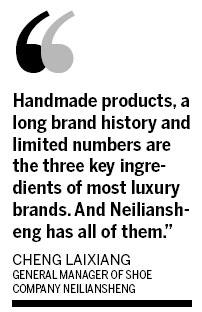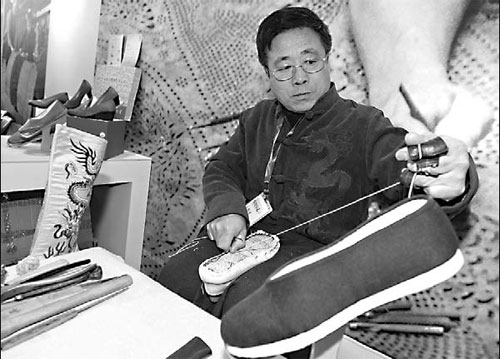Sole trader's time-worn path to success
|
He Kaiying, a master shoemaker at Neiliansheng, demonstrates his expertise in stitching soles. Provided to China Daily |
Zhao Ting was a man obviously well ahead of his time.
More than 100 years ago the Beijing shoe-company founder issued a kind of mission statement that more or less said: "We're here to serve the person sitting in the sedan chair, not the one pulling it."
Today a business textbook would probably render that as "target those at the top end of your market".
But whatever the interpretation, the formula seems to have worked a treat for the shoe company, Zhao founded.
Neiliansheng, founded in 1853, is not only in fine fettle, but seems as sure-footed as ever in its mission, with a clear idea of when it needs to stick to its roots and when it needs to innovate.
One of the most valuable parts of its heritage - apart from its trademark cloth shoes - is a method it devised to ensure it accomplished its mission: keeping detailed profiles of its customers.
Indeed, Neiliansheng is regarded as one of the first companies in Chinese commercial history to create what would now be called a database of its high-end customers.
The book that Zhao compiled, recording, among other things, customers' shoe sizes and fabric preference, was called Luzhong Beizai (shoe-data memoranda) and is regarded as such a classic of marketing, that it is used as a case study in MBA curriculums at colleges such as Peking University Guanghua School of Management.
In the cloth-shoe museum in Neiliansheng's flagship store on Qianmen Street, Beijing, visitors can see the Luzhong Beizai, which includes profiles of political leaders such as Mao Zedong, Zhou Enlai and Deng Xiaoping.
In 1956, the store was put into State-private ownership.

During the "cultural revolution" (1966-76), Luzhong Beizai fell into disuse, and about three years ago the company decided to write a modern version.
In early 2010, Neiliansheng set up a customer relationship system based on membership to manage the profiles of clients who need a customized service.
When customers enter the store, they select their favorite fabric and pattern, and then designers tailor and measure their feet. And all the data, including the sizes, shapes and preferences, are recorded in a computer.
"When the customer wants to buy another pair of Neiliansheng shoes, they don't have to come to the shop," said Cheng Laixiang, the general manager.
"This is why it is more convenient than shopping in physical stores and why the shoes fit better than when you shop online."
To date, the modern Luzhong Beizai has collected information about nearly 4,000 customers. The system also helps analyze customer habits, which provides a guide to market trends.
"The modern database is a huge asset for the business," Cheng said.
Last year, Neiliansheng took one of its trickiest orders: to make a pair of shoes for the former vice-president Zeng Qinghong, which were being given to him as a get-well gesture.
The problem was, that for a month Zeng's heels needed to stay clear of the ground, and many shoemakers said they could not fulfill the order.
Neiliansheng finally came up with a pair of shoes sporting heels with 10 layers that were 3-centimeter thick.
"Every three days the patient tore off one layer without feeling it, and one month later the last layer was torn off and the feet touched the ground," Cheng said.
"We aim to meet a customer's specific demands, and that's not a privilege limited to political leaders. But a pair of customized shoes is usually three to four times the price of a pair of ready-to-wear shoes."
Neiliansheng's best-selling design have always been ones with multi-layered soles, each layer made of 100 percent sweat-absorbent cotton cloth. Each shoe usually has 30 layers, stitched with thin linen threads.
The pieces of cloth sole are rinsed and starched, and then the shoe is assembled in a process that includes steaming, hammering and using moulds.
"Making a pair of soles requires about 5,000 stitches to ensure it will not deform or crack," said He Kaiying, a master shoemaker at Neiliansheng.
"The most expert shoemaker can make only two pairs a day, but we cannot blindly expand our capacity at the price of sacrificing quality," he said.
The founder, Zhao Ting, first set up the brand after he had finished an apprenticeship at a local shoe shop.
To fill what he realized was gap in the market, he decided to make court boots for top officials, and his business acumen helped him win venture capital.
In the brand name, nei means the royal court and liansheng means successive promotions, indicating the courtiers wearing his shoes were those who were being constantly promoted.
Each pair cost the same as 1.5 kilograms of silver at the time, or the equivalent of an ordinary person's living costs for five years.
With such a high price tag, and the exquisite craftsmanship involved, Neiliansheng shoes soon became recognized as the choice of the wealthy.
A year after Zhao set up shop in Beijing, Louis Vuitton established a fine luggage store in Paris.
While LV remains one of the world's most famous luxury fashion brands, these days Neiliansheng shoes are not restricted to the well-off.
A pair of handmade Neiliansheng cloth shoes can cost little more than 300 yuan ($47).
"But it has always been considered a blue-blooded brand," Cheng says.
"Handmade products, a long brand history and limited numbers are the three key ingredients of most luxury brands. And Neiliansheng has all of them.
"For historical reasons, such as wars and the 'cultural revolution', the brand failed to develop, and in fact almost died, in the last century.
"But the current social environment has made it a prime time for retail choice, and our target is to reshape Neiliansheng as a high-end brand, despite its very affordable price."
Neiliansheng shoes are regarded by many people as a symbol of Beijing, a must-buy souvenir for tourists.
The company's revenue was 70 million yuan ($11 million) in 2010, and more than 80 million yuan last year. The figure is expected to exceed 100 million yuan this year, Cheng said.
But the company is certainly not standing still and is busy renovating its product line.
For example, chic cloth shoes for women now account for 20 percent of its sales, altering a balance that had traditionally heavily favored men's shoes.
The change has been largely credited by the wearing of Neiliansheng silk shoes by female event hostesses at the Beijing 2008 Olympic Games.
"Now we also make comfortable slippers, though not as many customers as we would like know that yet," Cheng said.
Realizing that it has to keep up with the times, despite its 159-year history, Neiliansheng is adopting the very latest marketing techniques to ensure its future continues for many more years to come.
"We are planning to use all the most modern ways of telling people they should enjoy our shoes.
"That will include micro-blogging, and other marketing methods," added Cheng.
"We have been officially designated a 'time-honored brand', and that makes us very proud. We certainly plan to continue to perform as impressively in the future."
xiaoxiangyi@chinadaily.com.cn
(China Daily 08/25/2012 page10)















